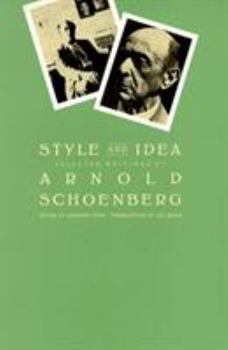Style and Idea: Selected Writings
Select Format
Select Condition 
Book Overview
This book is full of essays which Arnold Schoenberg wrote on style and idea. He talks about the relationship to the text, new and outmoded music, composition in twelve tones, entertaining through... This description may be from another edition of this product.
Format:Paperback
Language:English
ISBN:0520052943
ISBN13:9780520052949
Release Date:November 1984
Publisher:University of California Press
Length:560 Pages
Weight:1.55 lbs.
Dimensions:1.3" x 5.9" x 8.9"
Customer Reviews
3 ratings
Brilliant articles from a master composer and teacher
Published by Thriftbooks.com User , 16 years ago
I'm afraid that I am totally in love with the work of Arnold Schoenberg, so don't expect this review to be objective. I know that people have problems with his music, but it's never been a problem for me: works like the String Trio, A Survivor from Warsaw, Verklarte Nacht, the Kol Nidre and Moses and Aron have been some of the most rewarding and intense musical experiences of my life. I know that later composers such as Philip Glass and Steve Reich, who grew up with the legacy of twelve-tone music hanging over them, decisively rejected Schoenberg's work and decided to do something completely different, and in my opinion they were just plain wrong; the extreme banality and repetition in most of their music bears me out, I think. (I make an exception for Glass because some of his earlier stuff such as "Einstein on the Beach" has a fiery, rockish energy, but I have never had any time for Reich's twittering.) So, OK, I love Schoenberg. Not only was he a great composer but he was also a fine writer. His literary legacy is sizable, and not all of it is of interest to people who aren't either musicians or fans of his work. Most of his work is pedagogical in intention. The unfinished textbooks "Fundamentals of Musical Composition" and "Structural Functions of Harmony" consist mostly of carefully chosen musical examples. The earlier "Theory of Harmony" is one of the few books of musical theory that can be read with pleasure by people who can't read music. "Style and Idea" contains a rich selection of the shorter articles, some of which aren't all that short. The musical tradition that Schoenberg inherited and grappled with all his life was the Austro-German one. You won't find anything here about those flighty Italians. You will, however, read his highly influential "Brahms the Progressive", which did much to rehabilitate Brahms' music during a period when he was often unfavourably compared to his extravagantly inventive contemporary Richard Wagner. (Interesting that Schoenberg used to be regarded by conservative English music critics as a decadent offshoot of Wagner, when Schoenberg actually regarded Wagner with some ambivalence and was far more willing to admit his debt to Brahms' virtuoso craftsmanship.) Elsewhere, there are fascinating articles on Schoenberg's own lifelong struggles as a musician, acute assessments of other composers and some bracingly acerbic pieces about attempts by composers such as Bartók to incorporate elements from folk music into the classical tradition, a tendency which Schoenberg was very much against. This collection doesn't contain one of my favourite pieces of Schoenberg polemic: a letter Schoenberg wrote to Olin Downes, who was the music critic of the New York Times, after Downes had written a glibly dismissive review of a concert of music by Mahler. In a few brief paragraphs written in his slightly odd but always terrifyingly clear English, Schoenberg outlined the relationship between artists and c
The Work of a Genius
Published by Thriftbooks.com User , 17 years ago
Arnold Schoenberg is one of the most brilliant minds of the twentieth century, not just in the field of music. This is not only an excellent reference of some of his seminal writings, but it's also a great read for anyone who would like a better understanding of the musical landscape of the early 20th century through the eyes of a genius. His scholarship is just as beneficial to us as his compositions.
one-of-a-kind
Published by Thriftbooks.com User , 18 years ago
This book is nothing short of an institution in attidude,insight and understanding toward art. Shoenberg was an amazing teacher,artist and musician. That book is definitely a keeper,and I have bought A LOT of textbooks about harmony,counterpoint,you name it. But that one is really unique. It's like he's there sitting in front of you and REALLY dwelling into the profoundest thoughts about music,art,life. His thoughts,ideas,reasonings,are always very,very insightful. Like no-one else. He is always talking very seriously,but ,like a real master,what he talks about is always full of content and meaning. Always personal yet impersonal,and very ,very intelligent (the word 'very intelligent' hardly does him justice,really .). At times his focused sarcasm makes me laugh too,I love his clear and truly remarkable reasoning. For the ones that would not buy this book ONLY because they do not like his music,it is a prejudice that will prevent them to discover the causes of ignorance and will also miss the opportunity to achieve clarity onto subjects that very few,if any,would confront in the way that Arnold Shoenberg does. Amazing and beautiful.





